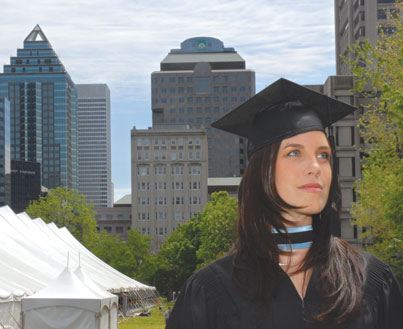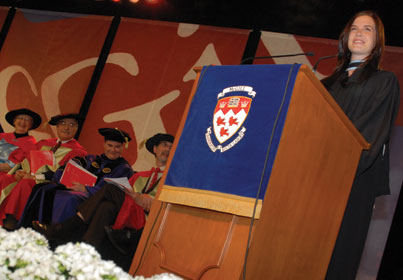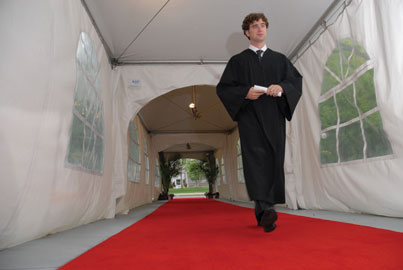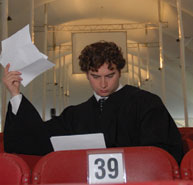"I've Got One Last Thing to Say Before I Go..."
"I've Got One Last Thing to Say Before I Go..." McGill University
User Tools (skip):
"I've Got One Last Thing to Say Before I Go..."

McGill's valedictorians hit the stage this spring with a common goal: Don't be lame
BY SIMONA RABINOVITCH
PHOTOS BY RACHEL GRANOFSKY
Michelle Kissenkoetter, BA'08 (pictured at left) had a surprise in store for her family when they attended her McGill convocation on May 30.
Her entire clan, grandmother included, had flown in from Guatemala to see Kissenkoetter graduate. They expected to catch a few brief glimpses of Michelle on stage as she was handed her diploma. Instead, Kissenkoetter was one of the star attractions, joining an illustrious group whose ranks have included the likes of medical pioneer William Osler, MDCM1872, and Prime Minister Wilfrid Laurier, BCL1864.
She was the valedictorian for her graduating class.
"Being there on stage, looking out at everyone, was a unique perspective from which to graduate," says Kissenkoetter, who majored in political science and international development studies and minored in economics. "I had a different vision of the experience, and that was pretty neat." Valedictorians took part in six of McGill's spring convocation ceremonies: Agricultural and Environmental Sciences, Health Sciences, the Desautels Faculty of Management, Law and two Arts convocations. McGill's valedictorians are selected in different ways, depending on their faculty.
VETTING THE VALEDICTORIANS
In the Faculty of Arts, for instance, a committee made up of the dean, the president of the Arts Undergraduate Society (AUS) and four other students is responsible for picking the valedictorians. Of the dozen or so students who apply for the position each year, about six are invited for interviews.
Grades are important, says AUS vice-president (academic) Patrick Boily, who chairs the selection committee. So is evidence of leadership and community involvement. "We're also looking for that extra little thing that might set somebody apart. Is this someone who will be memorable [to fellow graduates]?"
At the same time, says Boily, you don't want a valedictorian who is a little too special. "We want someone that people can relate to, someone who has shared many of the same experiences at McGill."
Picking the final two is no easy chore. The committee spent more than three hours debating the merits of each candidate. "It was the toughest thing I had to do all year," Boily says.
A similar process plays out in the Desautels Faculty of Management, says Glenn Zabowski, BCom'90, MBA'92, the director of the bachelor of commerce program. In his faculty, students are also invited to apply for the honour and the different candidates are vetted by a committee that includes Zabowski, students from the Management Undergraduate Society and professors from the faculty. While arts students vying to be valedictorians have to be rock-solid classroom performers (at least a 3.5 GPA is best), the pressure to produce academically is even higher for valedictory aspirants in Zabowski's faculty, where students need to be in the top 5 per cent of their graduating class to even be considered. While community involvement and leadership skills are important considerations, "we really want this to be an academic award," stresses Zabowski.
YEARNING TO BE ORIGINAL

Valedictorian Michelle Kissenkoetter addresses fellow graduates at one of the Faculty of Arts convocations on May 30.
No matter how each arrived at the podium, this year's McGill valedictorians shared certain qualities: enthusiasm, ambition and a well-rounded philosophy of life. They also all knew that their peers were a fairly sophisticated bunch, so they strived to deliver words of wisdom that would be both relevant and original — who wants to hear yet another aria about following your dream? "I based my speech on a Buddhist proverb: 'Perfect isn't better, better is perfect,'" says Kissenkoetter. "It's difficult in your last year when you're focused not only on graduating, but also on everything that's supposed to come after graduating, like finding a job. So, instead of aspiring for perfection, try to improve yourself, and the world around you, step by step." As for Kissenkoetter's own future, first up is a fellowship with Insight Collaborative, a Boston-based NGO that specializes in conflict resolution. She'll be travelling to Lebanon and Sri Lanka and will work with the International Criminal Court in The Hague.
It won't be her first international experience. After high school, Kissenkoetter took a break from school to work with a development agency in southern Africa. At McGill, Kissenkoetter landed a Faculty of Arts internship with the United Nations Development Programme, doing work in support of national elections in Guatemala, her country of origin.
Kissenkoetter was talked into applying to be a valedictorian by a close friend. In the case of Jeremy Delman, BA'08, he tossed his name into the valedictorian ring pretty much on a whim. "I get a kick out of public speaking, and after attending commencements at other schools where valedictorians delivered addresses that went on forever, were boring, or didn't speak to what the class wants to hear, I wanted to make sure my speaker wasn't crappy."
Communication has been a theme of Delman's five years at McGill. Much of the 23-year-old's time was consumed by the McGill Daily newspaper, where he worked as an editor. "It's such an intense job, it takes up your whole life," says Delman. He is in New York these days, attending law school at Columbia University. But Delman isn't necessarily done with journalism just yet —he expresses interest in examining "public policy-making from a journalistic point of view."
Delman recalls toiling on his valedictory speech for several weeks. Then, a few days before commencement, he tore the thing up.
"I thought, 'This doesn't sound like me, it's so formal and boring.'" The new one, he says, wrote itself. "I did it in the form of a love letter to the University. I tried to tap into the shared experiences we all had, both good and bad, to keep it short and sweet, and to avoid clichés like 'believe in yourself.'" His four roommates heartily approved.
Striking an original chord is a challenge, agrees Erica Pimentel, BCom'08, who served as the valedictorian at the convocation for graduates of the Desautels Faculty of Management. "Just Google 'valedictorian speech' and there's tons of stuff out there," says the 21-year-old Montrealer. "I touched on subjects the students felt [connected to] and was happy to hear that people were moved." During her time at McGill, Pimentel was a vice-president of the McGill Accounting Society and represented the University in case competitions against other schools. In her valedictory address, she talked about the apprehension students feel upon entering the "real world" and how risks and opportunities can often be one and the same, all depending on how you approach the challenges facing you.
Pimentel, who began work as a chartered accountant shortly after graduation, says she is grateful for her management education. She started off studying science, but it wasn't a good fit for her. She views her management degree as "a second chance" that paid off.

Faculty of Law valedictorian Caolan Moore makes his way to the convocation tent on McGill’s lower campus before giving his valedictory address on May 26.
Caolan Moore, BCL/LLB'08, applied for his faculty's valedictory gig while he was in Tanzania, completing an internship with the International Criminal Tribunal for Rwanda. "I felt I had something to say," says the 27-year-old, who headed to Ottawa after graduating to study for his Ontario Bar exams. "I tried to convey a reflection on maintaining focus and on staying centred. Law can be such a demanding profession that it's easy to get caught up. Sometimes, you have to remember the principles that brought you there." Moore, the former executive managing editor of the student-run McGill International Journal of Sustainable Development Law & Policy, hopes to build a career for himself in international law.

Moore consults his speaking notes before taking the stage.
Like his fellow valedictorians, Moore tried to steer clear of clichés in his address. "I was speaking to some of the most educated, intelligent people I've ever encountered, so I tried to reflect who we are as a class. Over the years you spend in school, you don't just remember the law, but the people around you — [who help] shape your view of the law."
Several of the valedictorians dealt with one common concern.
Addressing her classmates, Pimentel said, "I'm sure many of you are sitting here today thinking, 'Wow, this is it. This is the real world. This is what we've been working for. Am I ready?'"
Kissenkoetter expressed similar sentiments in her valedictory remarks. "Do we know enough, have we learned enough, to be able to accomplish those great things that are expected of us?" The answer was clear, at least for Kissenkoetter.
"We are intelligent, and resilient, et déterminés, et capables, and we can churn out a 10-page paper the night before it's due on only three hours of sleep and five cups of coffee. Now that's talent!"
Simona Rabinovitch is a Montreal-based writer specializing in music, travel and pop culture. She is the senior editor of Zink Canada and her work has also appeared in the Globe and Mail, Nylon, Paper, SPIN.com and Interview.


